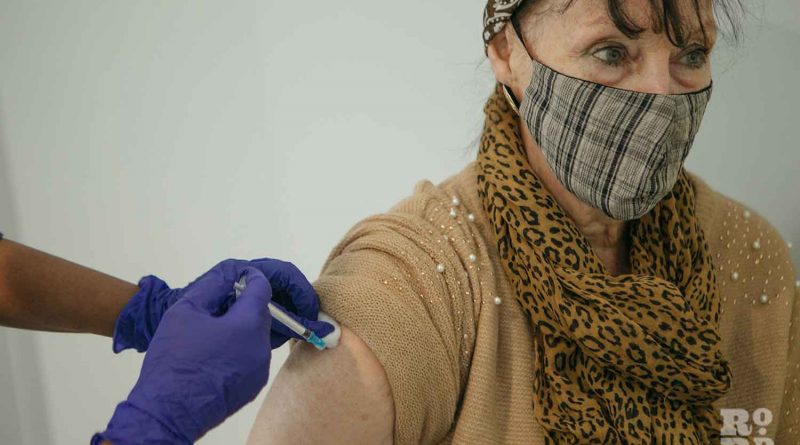Vaccine stories: Injecting hope at the Mile End Art Pavilion
Mile End Park’s stunning Art Pavilion has been turned into a vaccination centre to play its part in the fight against the pandemic. We get exclusive access to document this momentous moment in our history.
Grass-covered and glass-fronted with stunning views over serene water features and wild flowers, the Art Pavilion isn’t the kind of environment in which most people thought they would receive their coronavirus vaccination. Far from the sterile, clinical lights of a hospital or GP clinic, the pavilion in Mile End Park is light and airy, and also reassuringly enclosed into the earth like a cocoon.
Previously used as a gallery space, wedding venue and then covid testing facility, on 22 March the Council transformed this space into a vaccination centre. It has the capacity to vaccinate an incredible 10,000 local residents per week and is a one of Tower Hamlets’ main centres helping to increase the borough’s vaccination coverage.
More than 50 per cent of the adult population in the United Kingdom has now received a first dose of a coronavirus vaccine. Yet, as BBC analysis announced recently, the Borough of Tower Hamlets had some of the lowest levels of vaccine coverage in terms of the total adult population – currently 27 per cent.
This is in partly explained by the fact that our borough is relatively young – the majority of our residents is aged under 50 so yet to be offered a vaccine. But it is also due to hesitancy from some in the Asian community. However, the vaccination gap between ethnicities is narrowing thanks largely to a clinic at the East London Mosque helping to provide reassurance to those within its community.
Bengali speaking advocates such as Younus Hasan are on hand in the Pavilion too, to support patients who don’t speak English. Hasan helps them to fill out forms and answer the questions they need answering.
‘If I wasn’t here, I don’t know how lots of the vulnerable people would feel about COVID vaccine, but when they come here and I can speak to them and explain everything they feel great,’ he says.
Leaning on sticks, climbing out of wheelchairs, or tightly grasping the hand of a loved one, patients make their way up towards the sweeping entrance of the Pavilion drawn by the light of its pink, neon sign, which wouldn’t be out of place over the door of a nightclub. They are then guided by volunteers and NHS staff into its airy interiors, now transformed into an efficient vaccination centre.
After registering their details, receiving a squirt of hand sanitizer and a numbered ticket, guests are invited to sit in the waiting area towards the back of the Pavilion. Everyone waits patiently, gazing out of the window as swans, moorhens and even ducklings float by.
A nurse at the front of the room signals when it is the turn for the next person to come to a private vaccination booth for their vaccine. Today, the Pfizer-BioNTech vaccine is being administered. This requires a 15 minutes of observation so that nurses can check whether anyone has a reaction to the vaccine before sending them home.
Following the one way system, guests exit from the side entrance of the Pavilion. On the way out, most help themselves to a big blue badge, proudly declaring that they have been the recipient of one of the greatest scientific achievements in recent history.
Shirley Sweeney, 78, Isle of Dogs
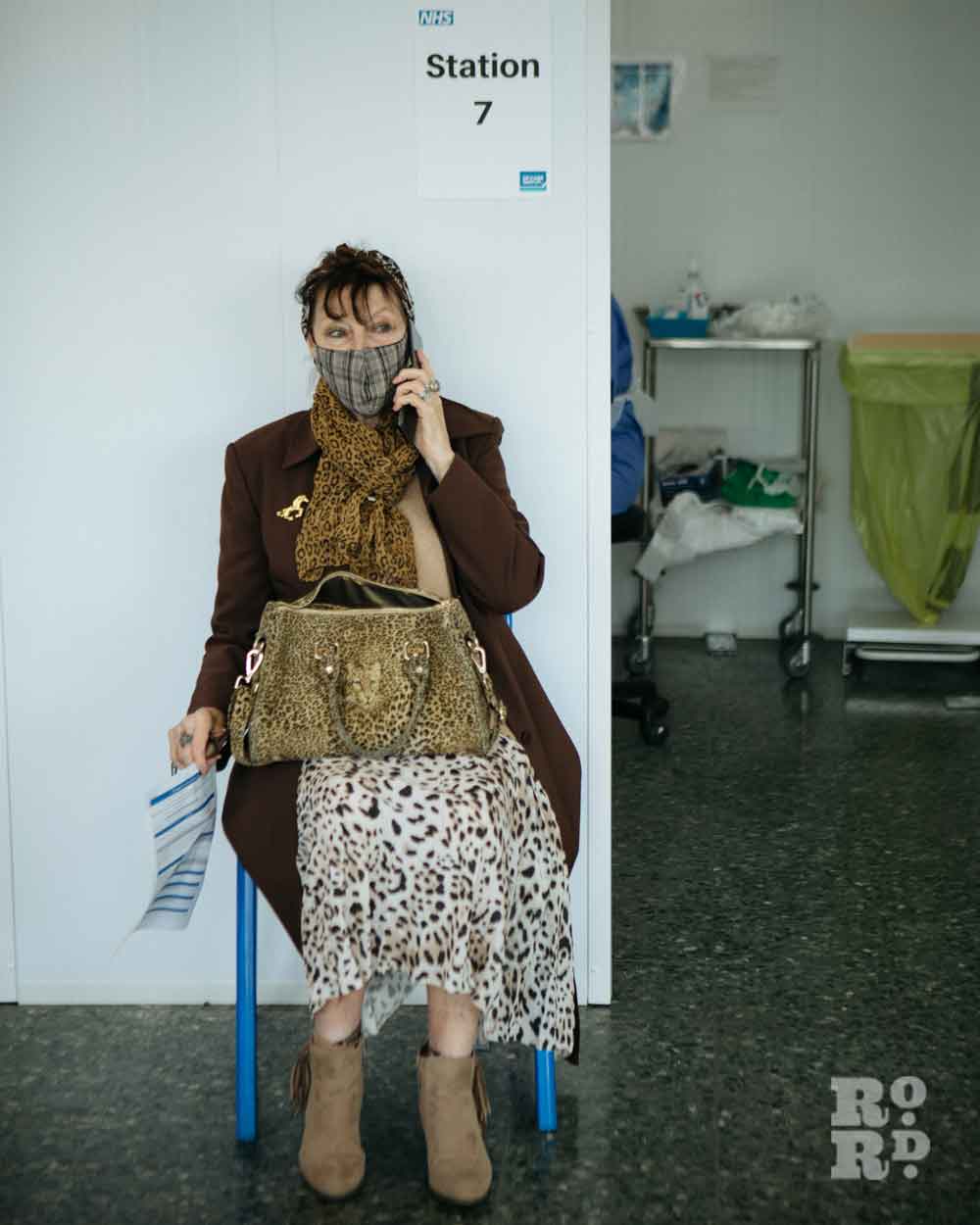
The picture of elegance dressed in matching animal prints and tartan, Mrs Shirley Sweeney is here for her second dose of the vaccine.
Sweeney decided to have the vaccine to make sure she could still be around to see her eleven grandchildren and seven great grandchildren. To keep in touch this past year, they’ve bought her a tablet with video calling. And there’s the two little ones that live locally and visit her from the bottom of the garden gate, but it’s not the same.
Overall though, nothing will ever really be the same again in Sweeney’s lifetime, but she doesn’t see that negatively.
‘I don’t think we’ll get back to the way it was,’ she says. ‘And sometimes I think it’s a good thing because people took too much for granted.
We got all these wonderful open spaces, we didn’t bother much with them, we was too busy sitting down in the house, drinking and chatting with the neighbours, we never ventured out.
And I’m not really one for museums, but I took all that for granted. I’d say “that’d be nice but I’ll go next week” and it never came, and then when I wanted to, it’s taken away from you.
I’m not patriotic but I think we’re great. I think we’ve coped with it the best we could under the circumstances.
Even youngsters, especially the youngsters – who was all for themselves – they haven’t been. They’ve turned themselves around and they’ve been really good. So I think it’s a lesson been learnt by all.’
Peter Timony, in his 70s, Bethnal Green
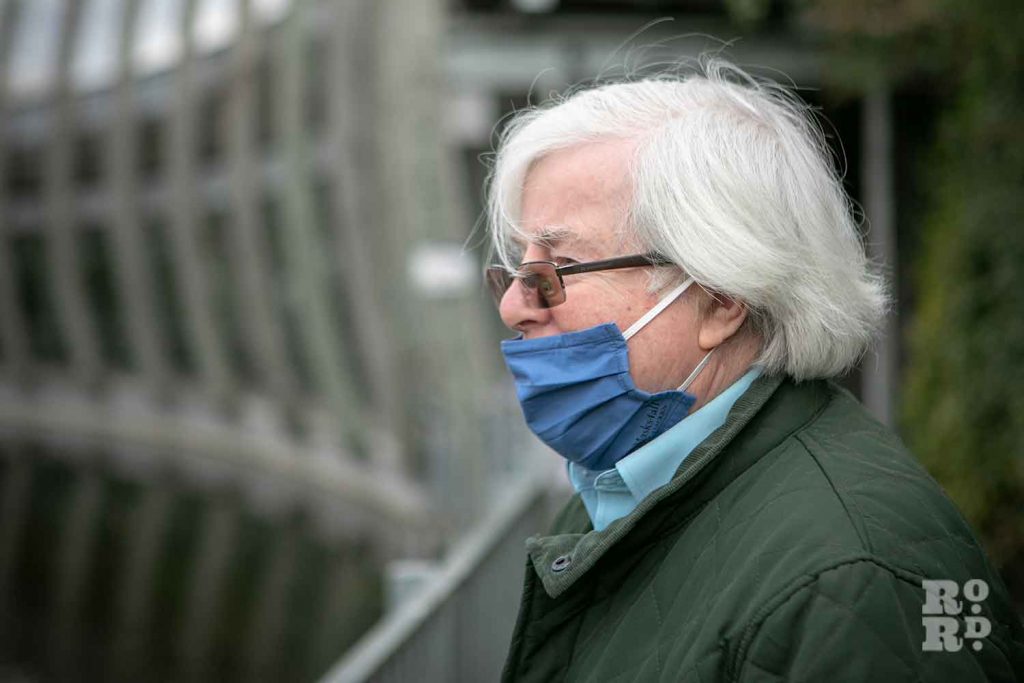
‘It was a no brainer! Well the fact is everyone was bloody dying weren’t they? If you feel like dying, jump off the bleeding bridge!’ says Peter Timony, when asked why he decided to get vaccinated.
And how did he feel receiving the injection?
‘I loved it! There was no pain at all, you don’t feel a damn thing… I said be careful with that bloody needle love, and she was. She laughed, so that was nice.’
Suotin Nessa, 75, and Abdul Salam, 48, Bow
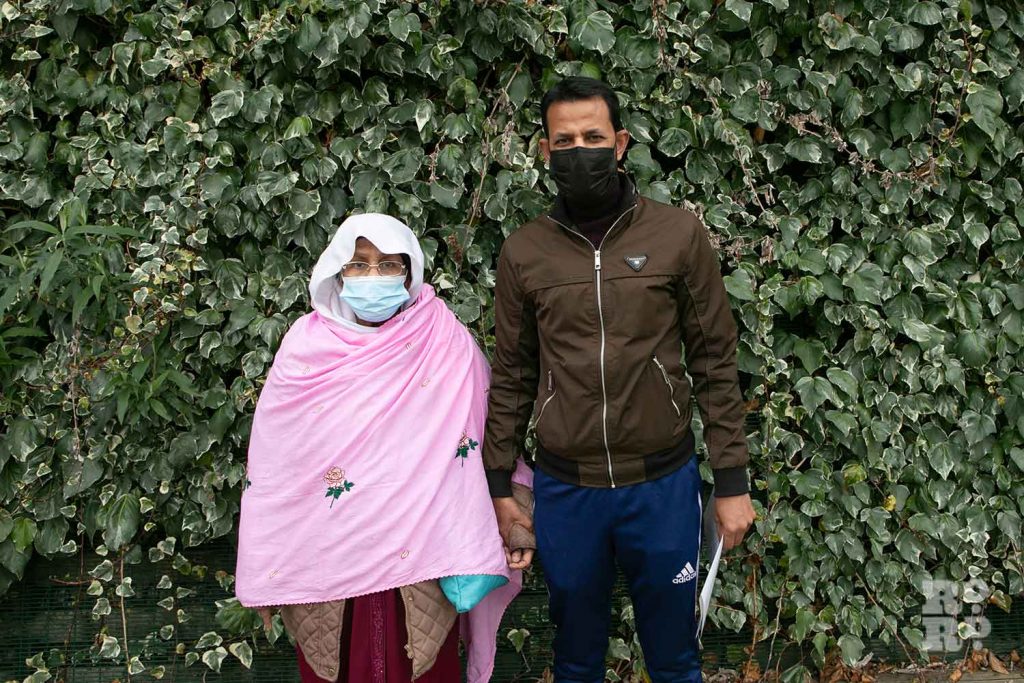
Arriving – and leaving – hand in hand, Suotin Nessa and her son Abdul Salam bring a pop of colour to the room thanks to Nessa’s bright pink shawl.
The duo are here for Nessa to receive her second dose. Though, Salam is slightly disappointed that he wasn’t allowed one too; ‘I wanted to go, I tried to go, but they said because of my age I am ok for now. Maybe next time.’
Nessa doesn’t speak any English, so her son translates for her. Asked why she has come to be vaccinated, Salam translates; “Because of her age, and she wants to save herself and save others.”
Salam describes how difficult it’s been for his mother this past year. Many of her friends in the surrounding area have died, either of COVID, other illnesses or old age. She has felt extremely lonely, as her son explains, ‘she’s the last one standing.’
The family has rallied around their matriarch. Salam explains, ‘You know, family is very important to Asian people, so we all try to live together. She lives on her own but we all go to see her; I go, my wife goes, my children go, my brother and sisters – we all go.’
Andy Mason, 42, Canary Wharf
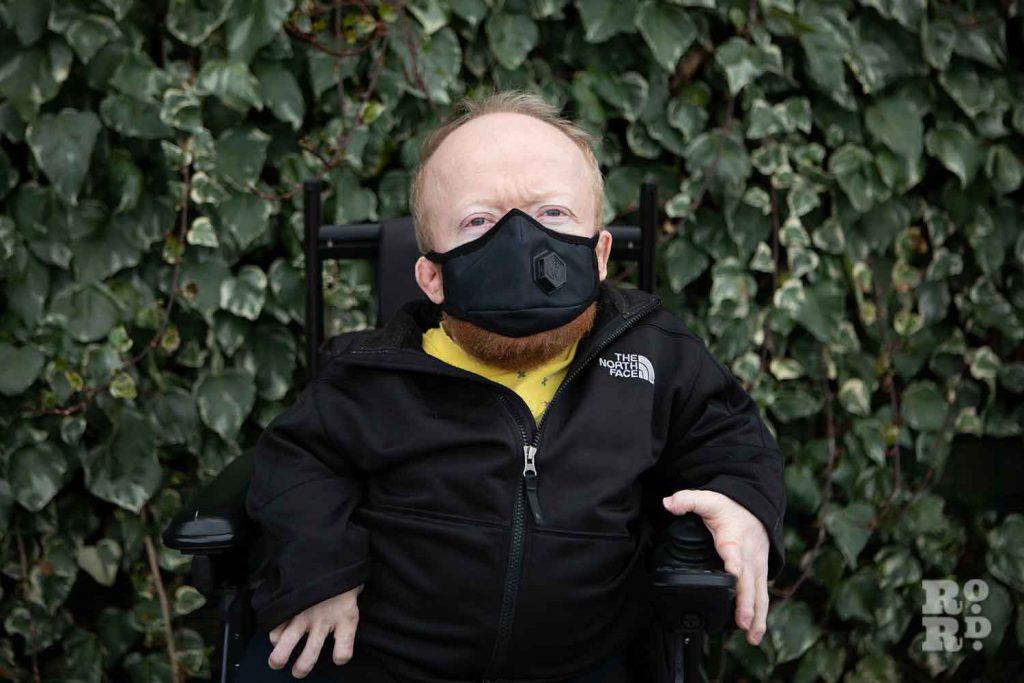
Andy Mason is here alone but, by pure coincidence, his parents are receiving their vaccine almost simultaneously at another location.
Mason has been isolating for the past year due to having breathing difficulties and he doesn’t think these restrictions will change dramatically post-vaccine; not in the short term at least.
‘Legally we still have to follow all the social distancing rules as before, so that doesn’t change, and I was being fairly careful and cautious before,’ he says.
‘Even sat in [the Pavilion] felt a little bit uncomfortable, you’re not used to being around people, and with the mask on, it still feels weird.’
What he is looking forward to however, is travel.
“I like to travel, that’s the other big reason to get it, for me. If and when that opens up… it keeps everybody safe, the more people who have got [the vaccine] the better blocker it is in preventing the virus spreading.’
‘I guess this’ll be a yearly event with this virus too,’ he adds with dry humour.
Geoff Logan 74, Tower Hamlets
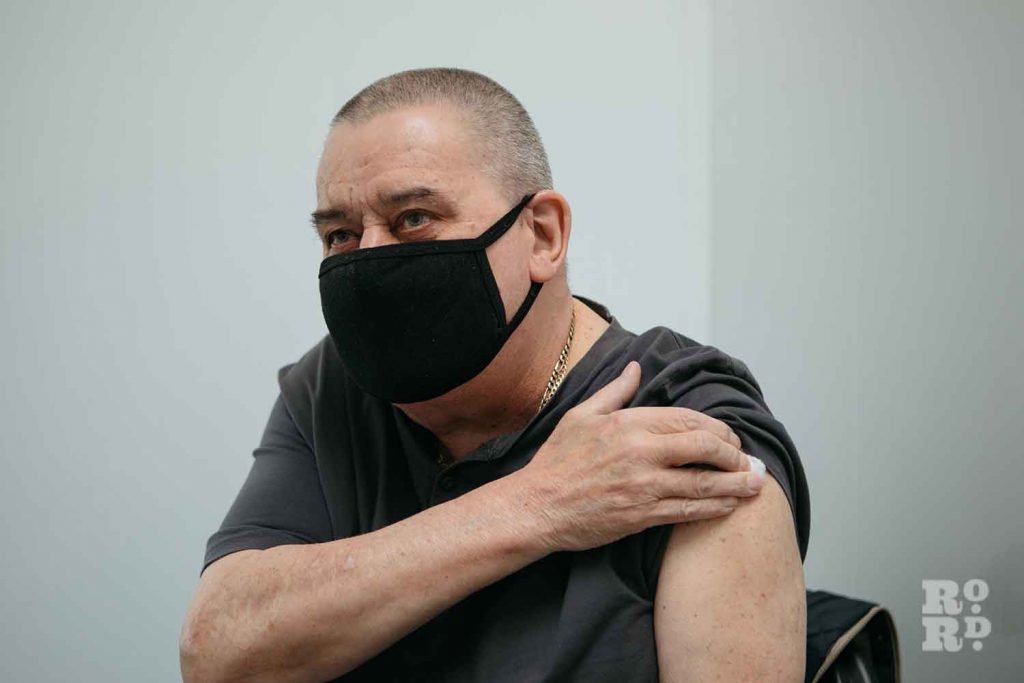
“Better to be safe than sorry!’ says Geoff Logan. He continues, ‘I feel a little bit safer, whether it works or not, who knows, but I’m hoping so!’
Asked what he’s most looking forward to after lockdown and once the pandemic has come to an end, he replies ‘Getting rid of this mask! And seeing me grandchildren, having them round for dinner.’
David Windle, 74, Poplar
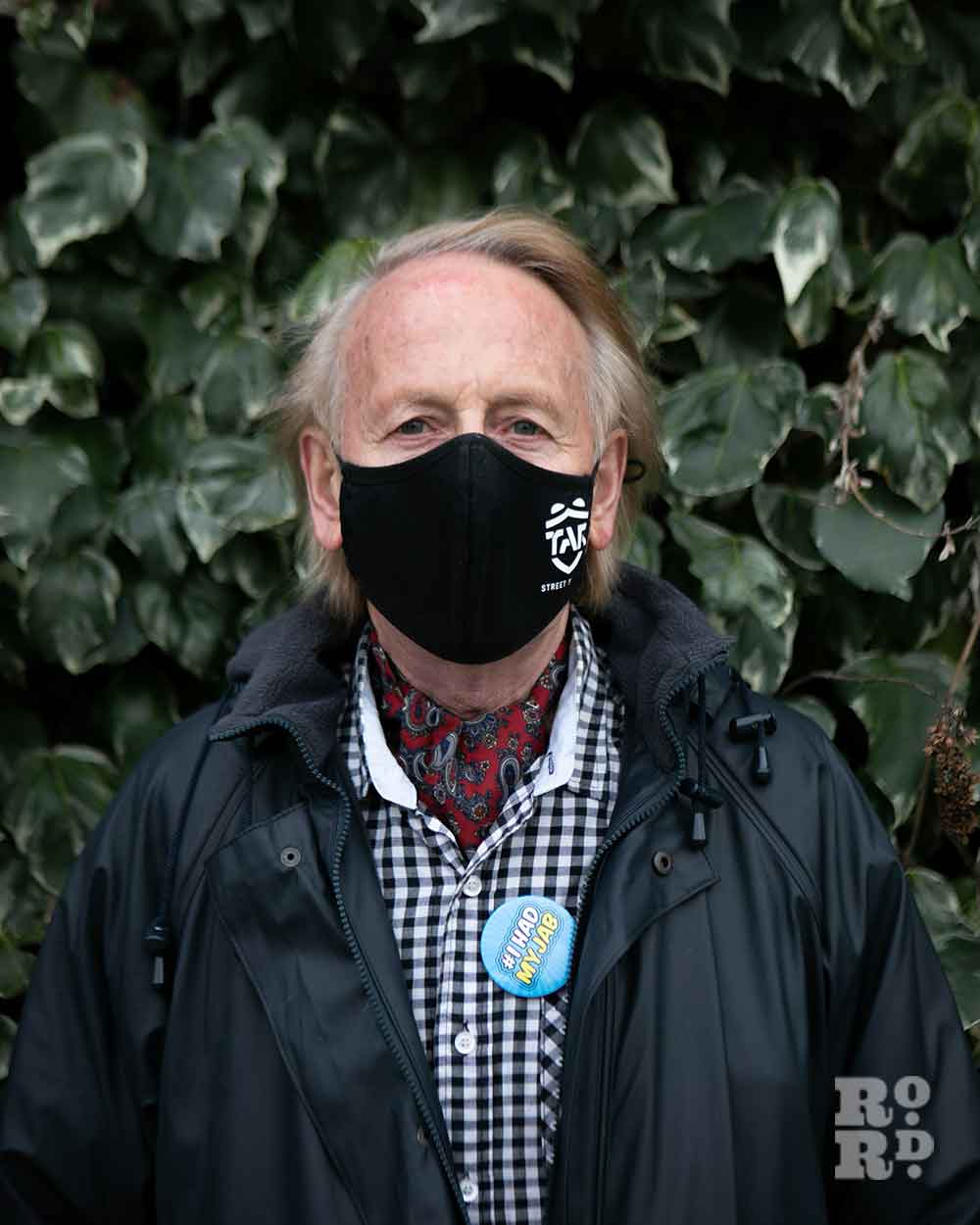
A keen swimmer, David Windle is absolutely chuffed to receive his second dose of the vaccine.
‘Capital P, protection, that’s what I want. Protection,’ he explains as he leaves the Pavilion. ‘This virus, even though you might get over it, it gets in your kidneys, your lungs, everywhere. And it knackers you up totally. And I don’t want to be knackered up!’
Before it closed, Windle would swim 40 lengths a day at the Mile End Leisure Centre, and he can’t wait to get back to it.
Windle has spent much of his life living in Portugal, running a hotel there with his wife, though he currently resides in Poplar while their son attends University. It’s been a year since he last saw his wife who stayed in Portugal to look after the hotel. He hopes the vaccine will allow them to be reunited soon.
‘All her Christmas presents are in my case waiting, ready to go,’ he says wistfully.
Asked how he found receiving the vaccination, Windle says, ‘everyone was kind. I bought them a box of chocolates to share between themselves. And the lady that gave me the injection, I gave her some sweets as well, just as a thank you for all they’ve done for us.’
After waving goodbye to Windle, we unwrap a couple of the Werther’s Originals that have been sneakily slipped to us during our conversation.
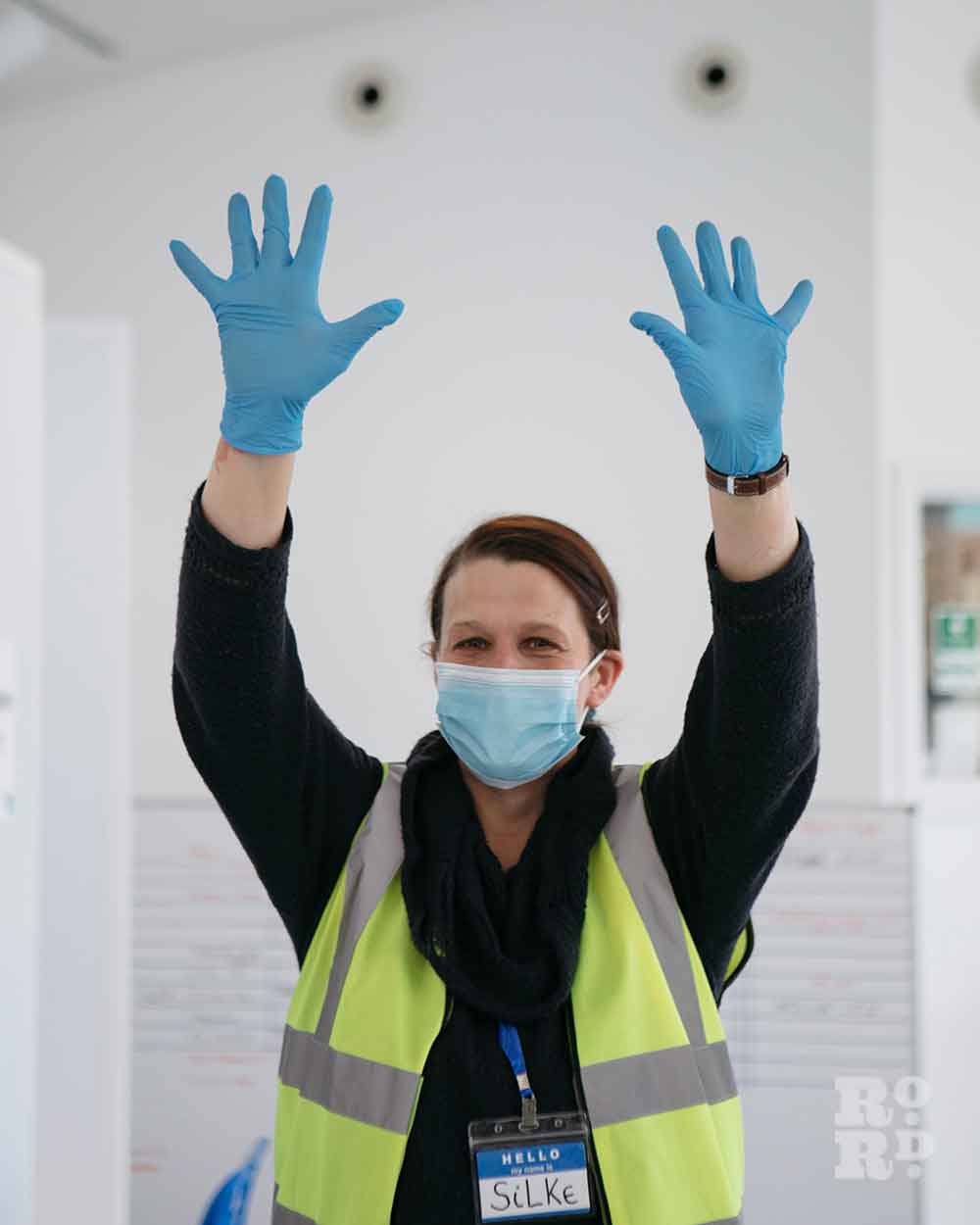
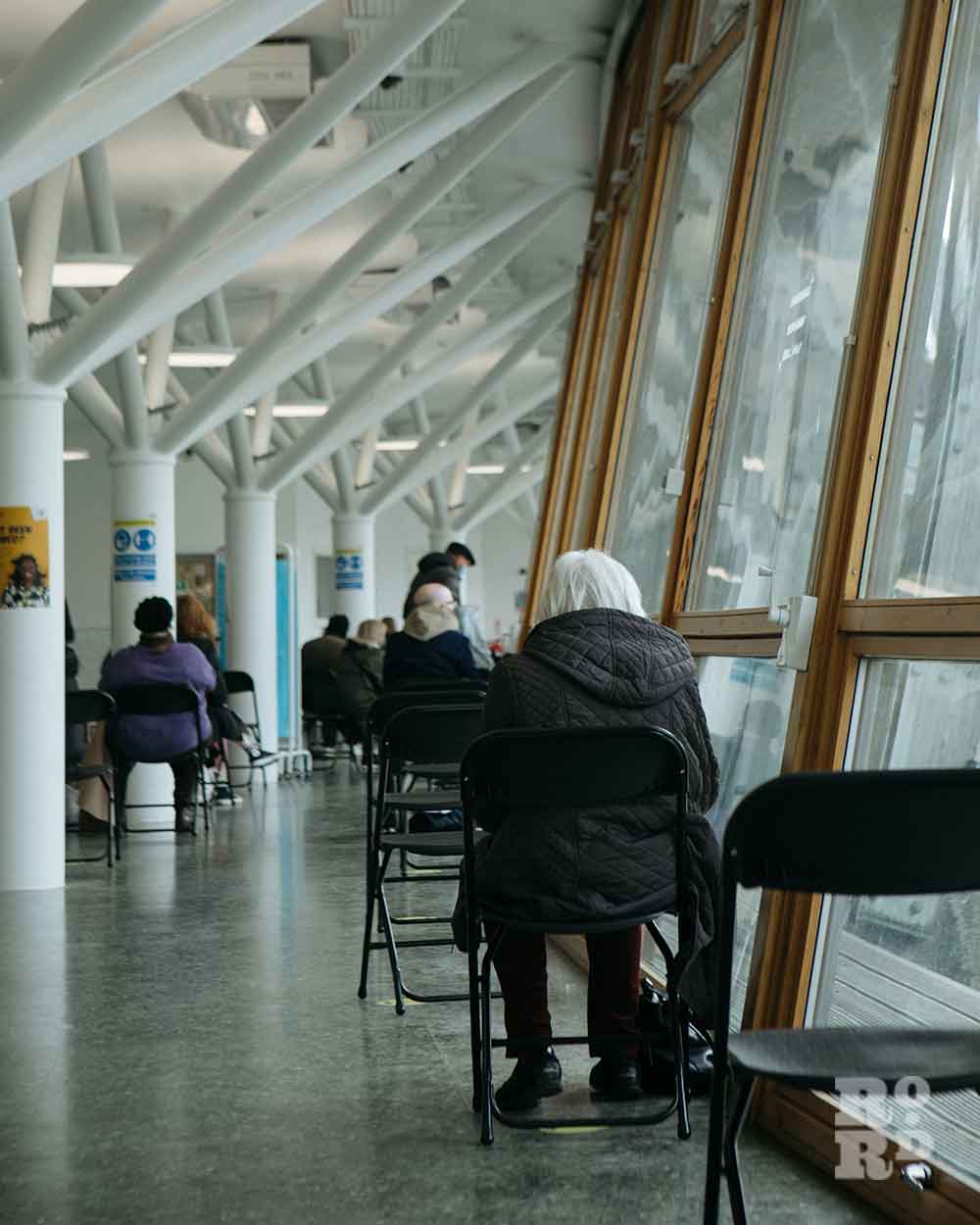
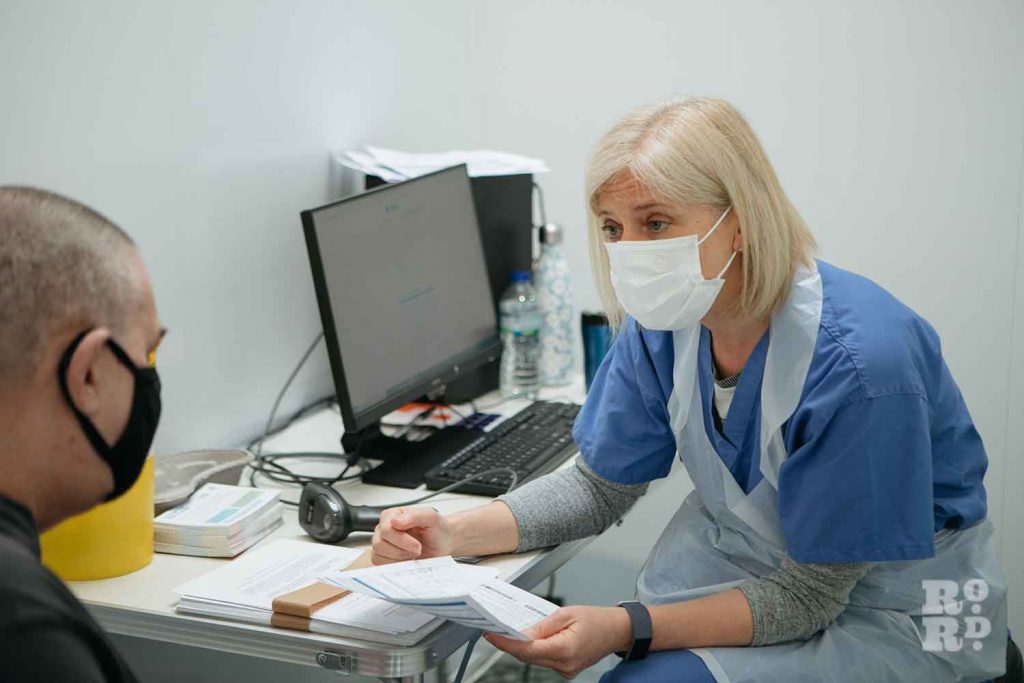
Make sure not to confuse the Art Pavilion with the Ecology Pavilion, located a few yards away further north of Mile End Park that has been repurposed as a covid testing site.
If you enjoyed this article, take a look at Rose Palmer’s photoessay of children in lockdown (peeping outside).

